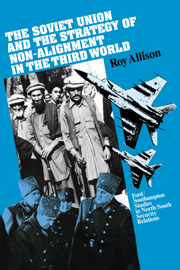Book contents
- Frontmatter
- Contents
- Acknowledgements
- Introduction
- 1 The Soviet view of non-alignment in the international order
- 2 The Soviet Union and the search for international security by the non-aligned states
- 3 Soviet policy and neutralisation in the Third World
- 4 Soviet policy and military alignment in the Third World
- Conclusion
- Notes
- Select bibliography
- Index
3 - Soviet policy and neutralisation in the Third World
Published online by Cambridge University Press: 15 December 2009
- Frontmatter
- Contents
- Acknowledgements
- Introduction
- 1 The Soviet view of non-alignment in the international order
- 2 The Soviet Union and the search for international security by the non-aligned states
- 3 Soviet policy and neutralisation in the Third World
- 4 Soviet policy and military alignment in the Third World
- Conclusion
- Notes
- Select bibliography
- Index
Summary
The Soviet attitude to neutralisation in the Third World has a direct bearing on Soviet policy. Neutralisation has an established legal pedigree and in contemporary conditions it remains a possible political formula to resolve or dampen down certain regional conflicts or to stabilise regional conditions which otherwise could escalate into a superpower confrontation. In this sense the neutralisation of a distinct country or region would be intended to lead to its withdrawal from the contest of interests between the Great Powers, at least in the military sphere, and would require assurances or guarantees from these powers to this effect. It would require specific restraints on Great Power conduct with respect to the neutralised country or region. Most Third World states would prefer these to be formulated at an international conference with the blessing of the United Nations. From their perspective this would be the most ‘democratic’ procedure. Neighbouring states and international bodies could also be brought into the settlement which would preferably be enshrined in a treaty.
Alternatively, in a more traditional diplomatic style, a country could be neutralised, preferably with its own consent (if a viable political force which can speak on behalf of the nation or territory concerned can be identified) through arrangements arrived at by the superpowers, perhaps at summit discussions, with or without the involvement of other Great Powers or regionally influential states.
Information
- Type
- Chapter
- Information
- Publisher: Cambridge University PressPrint publication year: 1988
